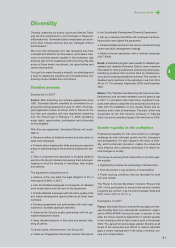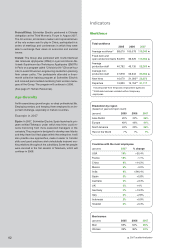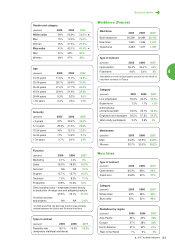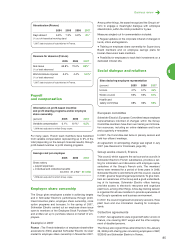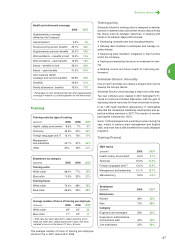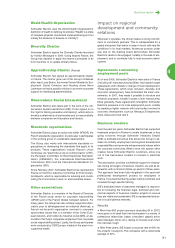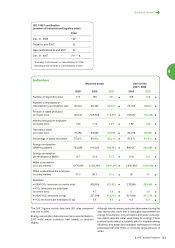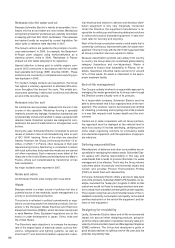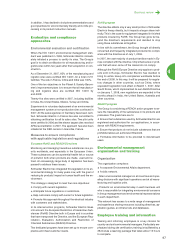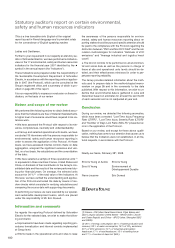APC 2007 Annual Report Download - page 93
Download and view the complete annual report
Please find page 93 of the 2007 APC annual report below. You can navigate through the pages in the report by either clicking on the pages listed below, or by using the keyword search tool below to find specific information within the annual report.
91
4
Business review
World Health Organization
Schneider Electric uses the World Health Organization’s
definition of health in defining its policies ("Health is a state
of complete physical, mental and social well-being and not
merely the absence of disease or infirmity").
Diversity Charter
Schneider Electric signed the Diversity Charter launched
by
Institut Montaigne
in 2004. Going beyond France, the
Group has decided to apply the charter’s principles in all
host countries or to update similar policies.
Apprenticeship Charter
(France)
Schneider Electric has signed an apprenticeship charter
in France. The charter grew out of the Group’s initiatives
after Jean-Louis Borloo, the former French Minister for Em-
ployment, Social Cohesion and Housing chose Henri
Lachmann to lead a specific mission to promote corporate
support for developing apprenticeship.
Observatoire Social International
Schneider Electric also takes part in the work of the
Ob-
servatoire Social International
(OSI). It has signed on to
the “right to lifelong education and training”, which aims to
develop a relationship of partnership and co-responsibility
between companies and educators and trainers.
Standards organizations
Schneider Electric plays an active role within AFNOR, the
French standards organization. In particular, it participates
in the working group on sustainable development.
The Group also works with international standards or-
ganizations in developing the standards that apply to its
products. These organizations include France’s
Union
Technique de l’électricité et de la communication
(UTE),
the European Committee for Electrotechnical Standardi-
zation (CENELEC), the International Electrotechnical
Commission (IEC) and the International Standards Or-
ganization (ISO).
Since February 2007, Schneider Electric has represented
France on the IEC’s Advisory Committee for Environmen-
tal Aspects, which is responsible for advising and coordi-
nating the Commission’s work on environmental issues.
Other associations
Schneider Electric is a member of the Board of Directors
of the French study center for corporate responsibility
(ORSE) and of the French Global Compact network. For
many years, the Group has also actively supported
Asso-
ciation pour le développement du mécénat
(Admical), a
French not-for-profit organization involved in corporate
sponsorship issues that is a member of the Ceres Euro-
pean network, and
Institut du mécénat social
(IMS), an as-
sociation that helps companies implement their corporate
social responsibility policies. Lastly, the Group participates
work conducted by CSR Europe, notably in the area of oc-
cupational health.
Impact on regional
development and community
relations
Wherever it operates, the Group makes a strong commit-
ment to community partners. This is indispensable for a
global enterprise that wants to keep in touch with real-life
conditions in its local markets. Numerous projects under
way and on the drawing board demonstrate Schneider
Electric’s desire to be engaged, notably in the area of em-
ployment, and to contribute fully to local economic devel-
opment.
Agreements concerning
employment pools
As of end-2006, Schneider Electric’s main sites in France
(including all manufacturing facilities) had signed target
agreements with officials in charge of local development.
These agreements, which cover inclusion, diversity, and
economic development, have formalized the sites’ com-
mitments. In 2007, they made it possible to structure and
enhance proposals, notably in cases of site restructuring.
More generally, these agreements strengthen Schneider
Electric’s presence in its local employment pools, notably
by creating a tighter network with local bodies involved in
economic development such as
Réseaux Entreprendre,
Alizé, Diese
and
Club des 9.
Business creation
Over the past ten years, Schneider Electric has supported
employee projects in France to create businesses or buy
going concerns through Schneider Initiatives Emploi
(SIE)–a dedicated structure that allows the Group to ad-
dress its mobility, employment and regional development
responsibilities and promote entrepreneurial values within
the corporate community. What’s more, the system often
creates future Schneider Electric customers, since one
out of five businesses created is involved in electrical
work.
The association provides confidential support to employ-
ees during all stages of business creation, as well as af-
terwards, with a minimum follow-up period of three years.
The approach has been fully integrated in the personal/
professional development process for employees in
France. It is presented during career outlook seminars and
included through specific training.
SIE’s dedicated team of seasoned managers is responsi-
ble for reviewing the financial, legal, technical and com-
mercial aspects of business creation projects to ensure
they are viable and sustainable. SIE is represented and ac-
tive in local business networks.
Results
More than 600 project sponsors (including 60 in 2007)
have gone on to head their own businesses in a variety of
professions (electrician, baker, consultant, graphic artist,
asset manager, florist, etc.), daring to innovate even when
the road was rough.
After three years, SIE boasts a success rate of 80% for
the projects it supports. This compares with a nationwide
average of 50%.


